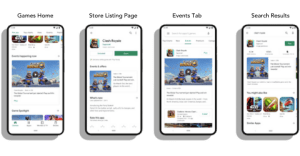Jay Bugeja is the Content Executive at Yodel Mobile, a leading mobile app marketing company. Assisting the agency’s growth efforts, Jay regularly shares insights on the latest app marketing strategies, promoting sustainable and long-term growth.
2024 is here, and with it comes many fresh ideas and opportunities for refining your app marketing strategy. Staying up to date with the latest trends and advancements is pivotal to ensuring your marketing strategies don’t fall flat this year.
Reflecting on the past year, Yodel Mobile accurately predicted critical shifts in the app domain, particularly with the advent of Apple’s Link Tracking Protection and Google’s Privacy Sandbox. Now, in 2024, these privacy solutions are set to be officially launched.
To proactively navigate the challenges this year, we have outlined the 5 biggest trends you must look for to find mobile success.
AI will become more common in marketing strategies
In the coming year, we anticipate a heightened presence of AI in the mobile app industry. AI is poised to play a more significant role, particularly in elevating customer relationship management campaigns to augment user experiences. Leveraging user data and behaviours, AI will contribute to crafting highly personalised interactions and tailored content, offering individualised product recommendations and content suggestions. While chatbots are already utilising this technology, we foresee a further refinement in their intelligence throughout the year, thanks to advancements in AI.
The impact of AI is already evident in the app industry, especially when looking at the advancements in AI. Adobe Firefly was introduced in 2023 to help integrate generative AI into creative teams to generate new images for app store listings efficiently. 2024 calls for heightened personalisation to become a critical factor for app success. Therefore, employing AI for enhanced efficiency, saving both time and resources for your team, will prove highly beneficial.
User generated content is going to play a pivotal role in performance campaigns
Incorporating User Generated Content (UGC) into paid acquisition campaign creatives has been a trending topic for several years. It has evolved from being a mere luxury to a vital component for the success of large-scale performance campaigns. While some apps have already begun experimenting with UGC, the upcoming trend is to systematically embrace this approach through influencer management platforms, making it an integral element in scaling performance campaigns in 2024.
The trust that users place in apps and the content they download plays a pivotal role in the success of app marketing efforts. Leveraging User Generated Content provides a layer of social proof and significantly influences potential user perceptions of your app brand. This strategic use of UGC is poised to enhance campaign effectiveness, leading to higher conversion rates and enabling personalised interactions throughout your marketing initiatives.
The shift to privacy will be rapid for the app industry
In 2024, privacy considerations are set to become a critical focal point. The impact of iOS SKAN reverberated through the industry a few years ago, significantly limiting the tracking capabilities of performance campaigns. Since then, many companies have sought ways to navigate these challenges. For instance, in creative testing, it has become customary to conduct most tests on Android and then apply the insights gained to iOS. However, as we move into 2024, it is anticipated that Android will face increased privacy restrictions, with the release of the Android privacy sandbox. Internally, we have been actively developing testing frameworks that align with privacy requirements, ensuring the continued collection of robust insights across both operating systems amid the evolving industry landscape. With the ongoing evolution of SKAN, including numerous new capabilities expected in 2024, and the possibility of a distinct approach from Google entering the scene this year, swift adaptation to the changing landscape is imperative for all.
Yodel Mobile has already conducted a comprehensive review of various privacy changes. The significance of these alterations for apps cannot be overstated. App marketers must proactively adjust to these changes and explore innovative methods to tackle data restrictions.
Enhanced app store features will fuel user acquisition and re-engagement
The latest advancements on Google Play introduce heightened visibility into experiments and expanded capabilities, mirroring those found in Custom Product Pages on iOS. Additionally, we are anticipating widespread availability of Promotional Content (Android’s counterpart to In-app Events) to all developers by 2024, a feature that has significantly boosted acquisition and re-engagement on iOS. These innovations empower App Store Optimization (ASO) to exert a more profound influence on marketing strategies, providing greater control over its role in the user acquisition journey and ultimately elevating acquisition Key Performance Indicators (KPIs).
The forthcoming accessibility of Promotional Content on Android presents an exciting prospect for app developers. Early results are promising, with apps incorporating this feature witnessing a 4% increase in revenue compared to those not utilising it. This development is poised to grant marketers more autonomy and enrich opportunities within the realm of ASO.
 Source: Promotional Content on the Play Store
Source: Promotional Content on the Play Store
A greater focus on evaluating true ROI
While there is a growing emphasis on Return on Investment (ROI) as a key performance indicator for app acquisition, companies grappling with legacy technology and those not prioritising mobile platforms face challenges in gaining visibility on this critical metric. We observe an increasing focus on data architecture initiatives aiming to discern the role of each platform and its contribution to overall ROI. This trend is expected to gain more significance throughout the year, particularly in light of privacy changes that complicate tracking this metric.
Given the privacy changes discussed earlier, marketers will need to strategise on how to monitor their app’s performance without violating these new regulations. Consequently, the imperative for success in 2024 will be to invest in innovative technologies that facilitate tracking user actions.
Conclusion
2024 promises to be a dynamic year for the app industry. With shifting consumer behaviours, technological advancements, and evolving privacy policies, agility in strategies remains paramount for app marketers.
Having recently won the Most Effective Mobile Campaign at the Effective Digital Marketing Awards in 2023, we have a pretty good idea of what will impact the mobile industry in 2024. Reach out to the Yodel Mobile app marketing experts for advice and support to make 2024 a success for your app.



